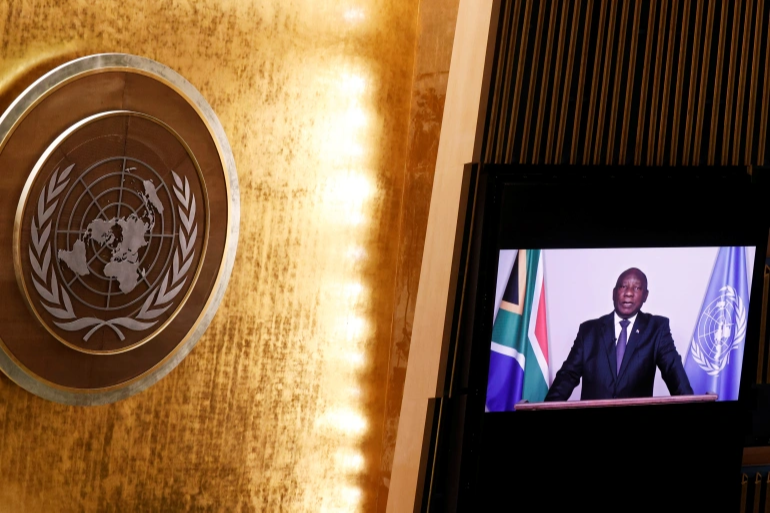
South Africa's President Cyril Ramaphosa delivers a pre-recorded statement at the UNGA [John Angelillo/Pool via Reuters]
United Nations, September 23 (RHC)-- The inequity of COVID-19 vaccine distribution came into sharper focus on Thursday as many leaders of African countries, whose populations have little to no access to the life-saving shots, stepped to the podium to speak at the United Nations General Assembly.
Already, the struggle to contain the coronavirus pandemic has featured prominently in world leaders’ speeches during the past few days – many of them delivered remotely because of the coronavirus itself. Country after country acknowledged the wide disparity in accessing the vaccine, painting a picture so bleak that a solution has at times seemed impossibly out of reach.
South Africa’s President Cyril Ramaphosa on Thursday pointed to vaccines as “the greatest defense that humanity has against the ravages of this pandemic.” “It is, therefore, a great concern that the global community has not sustained the principles of solidarity and cooperation in securing equitable access to COVID-19 vaccines,” he said.
“It is an indictment on humanity that more than 82 percent of the world’s vaccine doses have been acquired by wealthy countries, while less than 1 percent has gone to low-income countries.”
He and other African leaders urged UN member states to support a proposal to temporarily waive certain intellectual property rights established by the World Trade Organization (WTO) to allow more countries, particularly low- and middle-income countries, to produce COVID-19 vaccines.
Angola’s President Joao Lourenco said it was “shocking to see the disparity between some nations and others with respect to availability of vaccines.” “These disparities allow for third doses to be given, in some cases, while, in other cases, as in Africa, the vast majority of the population has not even received the first dose,” Lourenço said.
The United States, United Kingdom, France, Germany and Israel are among the countries that have begun administering boosters or announced plans to do so.
Benido Impouma, a programme director with the World Health Organization’s (WHO) Africa program, noted during a weekly video news conference that the surge in new COVID-19 cases is starting to ease in Africa “but with 108,000 new cases, more than 3,000 lives lost in the past week and 16 countries still in resurgence, this fight is far from over.”
“Fresh increases in cases should be expected in the coming months,” Impouma said. “Without widespread vaccination and other public and social measures, the continent’s fourth wave is likely to be the worst, the most brutal yet.”
On Wednesday, during a global vaccination summit convened virtually on the sidelines of the General Assembly, President Joe Biden announced that the U.S. would double to one billion doses its purchase of Pfizer’s COVID-19 shots to share with the world, with the goal of vaccinating 70 percent of the global population within the next year.
The WHO has said only 15 percent of promised donations of vaccines – from rich countries that have access to large quantities of them – have been delivered. The UN health agency has said it wants countries to fulfil their dose-sharing pledges “immediately” and make shots available for programs that benefit poor countries and Africa, in particular.
Biden, earlier this year, broke with European allies to embrace waivers to intellectual property rights for the vaccines, but there was no movement on Wednesday towards the necessary global consensus on the issue required under WTO rules.
While some non-governmental organisations have called those waivers vital to boosting global production of the shots, U.S. officials concede it is not the most constricting factor in the inequitable vaccine distribution – and some have worried the waivers would mean little without the necessary production infrastructure to make the highly complex jabs.

